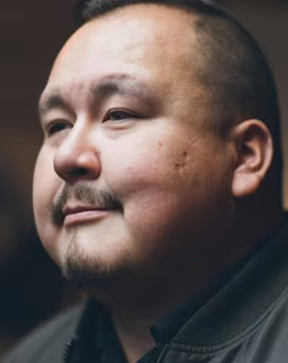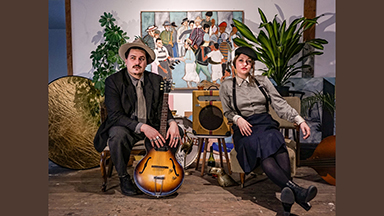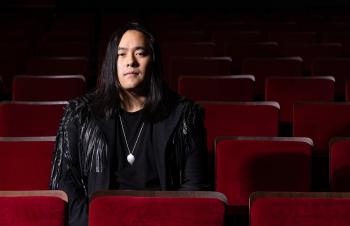Image Caption
Summary
Local Journalism Initiative Reporter
Windspeaker.com
The JUNOS could be breaking new ground this year with two Indigenous artists nominated in the Songwriter of the Year category.
With artists Aysanabee, Oji-Cree, Sucker Clan of the Sandy Lake First Nation, and William Prince, an Anishinabe from Peguis First Nation, it could mark the first time in nine years that Indigenous artists have been represented in the category. In fact, it could mark the first time ever.
Buffy Sainte-Marie was nominated as Songwriter of the Year in 2016, however, her Indigeneity is now drawn into question. Shania Twain, who won in 2000 and was nominated in 1999 and 2003, claimed Indigeneity but her status comes through adoption by a First Nations father.
“I guess it’s not too surprising,” said Aysanabee about how long it has taken for Indigenous songwriters to get this recognition.
“I think Indigenous people and advocates really pushed really hard to get the contemporary Indigenous category and the traditional ones just so we can get a seat at the table,” he said.
It wasn’t until 2022 that the JUNOS split the category for recognizing Indigenous artists or groups into two with Contemporary Indigenous and Traditional Indigenous.

Prince is also nominated for Stand in the Joy in the Contemporary Roots album category along with Indigenous artists Julian Taylor (Beyond the Reservoir) and Logan Staats (A Light in the Attic).
Other Indigenous artists being recognized in non-Indigenous-specific categories include Jeremy Dutcher (Motewolonuwok) and Shawnee Kish (Revolution) for Adult Alternative album; Morgan Toney (Resilience) for Traditional Roots album; Stirling John (Where I’m Meant to Be) for Contemporary Christian/Gospel album; and, Blue Moon Marquee (Scream, Holler & Howl) for Blues album.
Sterling Larose has received double nominations for Music Video of the year for “Damn Right” by the Snotty Nose Rez Kids and “feral canadian scaredy cat” by the artist called young friend, the latter he shares with Zachary Vague.
Indigenous artists Elisapie (Inuktitut) and Snotty Nose Rez Kids (I’m Good, HBU?) have had their albums nominated for the artwork.
“The fact that we're branching out and we aren't just (getting) pigeonholed…that we're getting access and getting nominations in these other categories is huge,” said Aysanabee, who is also nominated in the Contemporary Indigenous Artist or Group category, as well as Alternative Album of the Year for his EP Here and Now. “There's so many great artists before me, incredible songwriters that definitely should have been nominated. I'm proud to be up there and representing my people.”
Aysanabee’s nomination for Songwriter of the Year is for three songs he co-wrote for the Here and Now EP, the first time he’s done collaborations. Also a first, was writing songs that were driven by the music which then inspired the words. Part of that, he says, is because isolation during the coronavirus pandemic saw him “messing around with all these pedals and I get really inspired too by different chords and different soundscapes and that creates an emotion and then I can write to that as well.”
It was a different experience with his debut album Watin, named for his grandfather. Aysanabee made recordings of his grandfather’s life story and spent time “listening until something moved me in a way or maybe inspired me to write.”
Watin earned Aysanabee a JUNO nomination in the category of Contemporary Indigenous artist or group of the year in 2023. He also performed “We Were Here,” a track from that album, which includes references to Indian residential schools. He took the stage with Northern Cree at the JUNOS in Edmonton.
Despite a month rehearsing the performance, Aysanabee recalls being nervous and pacing behind the stage. Joel Wood of Northern Cree put his hand on Aysanabee’s shoulder and said, “Hey, we’re here with you man.”
“And that was such a nice thing to happen that put me at ease. But I do remember walking onto that stage and thinking, ‘Don't mess this up’ and it took me about half the song to truly get in the moment and then, in a blink of an eye, it was over,” he said.
But it wasn’t until he was on his way to Austin, Texas for the South by Southwest music festival that it hit him. At the airport in Denver, he pulled out his phone and the performance was tagged on social media. He watched it.
“There was just one moment where we finished the last chorus and it goes silent for a second and you hear this Indigenous woman do a ‘lay, lay, lay’ call…and Steve Wood gets up and says those powerful words and then suddenly the crowd erupts and that's when it hit me…I was overcome,” he said, recalling crossing the airport, sunglasses pulled on, sniffling and trying not to break down. “I was wondering what that feeling was for a long time, and it's, I guess, it was, honestly, just pride. Pride was love for what we did.”
Aysanabee admits that he’s “still kind of shocked” about getting three JUNO nominations this year.
“I didn't know it was insinuated that if you're invited to the announcements, you’ve got a nomination. So I went and I hoped I’d get something because I was in LA…(and) cut the trip short,” he said.
He says he is “super grateful” for the nominations, which is something that “can really help propel your career.”
“I don't know who sits on these boards, who votes, who is the jury for the JUNOS. I have some champions out there who felt that I was worthy of the nomination. So I'm going to try and do my best to honour that too…and that I do something with these nominations,” said Aysanabee, who added that the nominations do bring some pressure with them.
For the JUNOS, in the first stage of voting, 10 anonymous judges who are experts in that category, as well as demographically and geographically diverse, determine the five JUNO award nominees. In the second round, delegates from the Canadian Academy of Recording Arts and Sciences (CARAS) anonymously vote on the five nominees to determine the winner.
Aysanabee’s song “Ego Death” has, in part, garnered producer Hill Kourkoutis a nomination for the Jack Richardson Producer of the Year award.

Other nominees in the Contemporary Indigenous category along with Aysanabee are Blue Moon Marquee, Elisapie, Shawnee Kish and Zoon (Bekka Ma’iingan).
See our story on Blue Moon Marquee here.
Nominations in the Traditional Indigenous category include Joel Wood (Sing. Pray. Love.), Nimkii and the Niniis (LFS5), The Red River Ramblers (Reverie), Young Scouts (Drum Nation) and last year’s winners, the Bearhead Sisters (Mitòòdebi (For My Relatives)).
See our story on the Bearhead Sister here.
Aysanabee has just released via Ishkōdé Records a new song with American singer-songwriter Raye Zaragoza called “Come Out.”
Aysanabee was the first signing for Ishkōdé Records in 2021, a new Indigenous women-owned label. He says working with the label gave him more freedom and comfort to explore his Indigeneity.
“There’s things you just don't have to explain…They just get it. I don't have to explain why we need to take certain care with this. Or what protocols should be followed in this kind of regard because they come from the background,” he said, which was particularly important when he recorded Watin.
“There was some times where I was nervous about putting out the record and wondering if I need to go back and work on stuff because of the context of the record and I was worried about residential school survivors getting retriggered,” he said. “Being able to have other Indigenous people made it so much easier than trying to explain it to someone who wouldn't quite get it.”
On Feb. 23, Aysanabee kicks off his spot in Vancouver as a special guest on Allison Russell’s The Returner tour. The tour runs until May 23.
Russell is also nominated in the categories of songwriter, contemporary roots album and music video.
The JUNO Awards will take place March 24 in Halifax.

